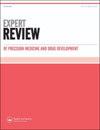Pharmacogenetic considerations in antiplatelet therapy
IF 1.2
Q4 PHARMACOLOGY & PHARMACY
Expert Review of Precision Medicine and Drug Development
Pub Date : 2020-05-20
DOI:10.1080/23808993.2020.1768844
引用次数: 1
Abstract
Oral antiplatelet therapy with aspirin and a P2Y12 receptor blocker constitutes a major strategy to prevent thrombotic events in patients with arterial diseases. Among available P2Y12 receptor blockers, ticagrelor is a potent direct-acting drug, whereas clopidogrel and prasugrel (thienopyridines) are prodrugs that require cytochrome (CYP) P450 based in vivo conversion to an active metabolite to irreversibly inhibit the P2Y12 receptor. Wide antiplatelet response variability was observed during clopidogrel treatment, with nearly one in three subjects exhibiting minimal or no inhibition of adenosine diphosphate-induced platelet aggregation. The latter phenomenon is termed clopidogrel non-responsiveness or resistance [1,2]. Despite these limitations and guideline recommendations for the preference of ticagrelor or prasugrel, clopidogrel remains the most used P2Y12 inhibitor in the current practice even in patients with acute coronary syndromes (ACS) [3–5]. Pharmacogenetics associated with P2Y12 receptor blocker therapy, especially clopidogrel, their clinical implications and potential utility of personalized antiplatelet therapy based on genetic testing are discussed here. Pharmacokinetic and pharmacodynamic studies have revealed that variable active metabolite generation is associated with clopidogrel response variability. The latter, in part, is affected by carriage of single nucleotide polymorphism (SNPs) of genes encoding CYPs that are responsible for clopidogrel metabolism. Among > 30 CYP2C19 alleles, CYP2C19 * 1, with normal activity, is the most prevalent allele. Carriage of a loss-of function allele (LoF) is associated with reduced clopidogrel active metabolite generation. In subjects with CYP2C19*2, the most common LoF, a guanine>adenine mutation in exon 5 of CYP2C19 (rs42442850) creates an aberrant splice site resulting in an altered reading frame at amino acid 215 and a premature stop codon 20 amino acids downstream. The final result is a nonfunctional truncated protein, lack of translation resulting from nonsense-mediated messenger RNA decay, or both. Other LoFs are *3-*8. LoF carriage is estimated at ~25%, ~33% and ~55% in Caucasians, African Americans and Asians, respectively. Carriage of a gain-of-function allele (GoF) (CYP2C19*17) is associated with increased clopidogrel active metabolite generation. Carriage of GoF is ~34%, 30% and 4% in Caucasians, African Americans and Asians, respectively [2]. In patients treated with clopidogrel, LoF allele carriage is associated with a reduced antiplatelet response, an increased prevalence of high platelet reactivity to ADP (HPR), and an increased risk for post-stenting ischemic event occurrence, including stent thrombosis. The relation between GoF allele carriage and clinical outcomes is less robust. The association between SNPs of paroxonase-1(PON-1) and ABCB1, clopidogrel metabolism, and clinical outcomes remains controversial [2]. CYP2C19 isoenzyme is not the only factor determining the antiplatelet response to clopidogrel, as even in poor metabolizers, some degree of platelet inhibition has been observed where no enzyme activity is expected [2]. In addition, gastrointestinal absorption, demographic variables such as old age, diabetes mellitus, and renal insufficiency; drug-drug interactions at CYPP450 levels such as calcium channel blockers, proton pump inhibitors; smoking status, obesity and adherence to clopidogrel therapy influence antiplatelet response independent of genetic polymorphisms of CYP2C19 gene [2]. The strong association of LoF allele carriage with clopidogrel response variability was confirmed in a genome wide association study conducted in healthy Amish individuals who were administered 75 mg/day clopidogrel for 7 days. CYP2C19*2 was associated with ADP-stimulated platelet aggregation after clopidogrel administration, with a high degree of statistical significance (p = 4.3 × 10). The relation of LoF allele carriage and adverse post-percutaneous coronary intervention (PCI) ischemic event occurrence was demonstrated in general CAD patients undergoing PCI and treated with clopidogrel in the same publication [6]. Phenotypic expression, as expected, remains variable within the genotype. Therefore, CYP2C19 genotype, except for the *2/*2 homozygous state cannot predict the presence of HPR with 100% certainty in patients treated with clopidogrel [7]. Observational studies and meta-analyses have demonstrated the strong relationship between LoF carriage and clinical outcomes, mainly in patients treated with coronary stenting. The latter has been shown to be dose-dependent with an increased prevalence of stent thrombosis associated with carriage of two LoF alleles compared to one LoF allele [8]. In May 2009, the United States Food and Drug Administration (FDA) added a ‘boxed warning’ about the use of other antiplatelet medications or alternative dosing strategies for clopidogrel in genetically predicted poor metabolizers [9]. However, current clinical guidelines do not recommend routine genotype testing [3,4]. Treatment with more potent P2Y12 receptor blockers such as prasugrel or ticagrelor, but not high抗血小板治疗中的药物遗传学考虑
然而,目前的临床指南不建议进行常规基因型检测[3,4]。使用更强效的P2Y12受体阻滞剂如普拉格雷或替卡格雷治疗,但不高
本文章由计算机程序翻译,如有差异,请以英文原文为准。
求助全文
约1分钟内获得全文
求助全文
来源期刊

Expert Review of Precision Medicine and Drug Development
PHARMACOLOGY & PHARMACY-
CiteScore
2.30
自引率
0.00%
发文量
9
期刊介绍:
Expert Review of Precision Medicine and Drug Development publishes primarily review articles covering the development and clinical application of medicine to be used in a personalized therapy setting; in addition, the journal also publishes original research and commentary-style articles. In an era where medicine is recognizing that a one-size-fits-all approach is not always appropriate, it has become necessary to identify patients responsive to treatments and treat patient populations using a tailored approach. Areas covered include: Development and application of drugs targeted to specific genotypes and populations, as well as advanced diagnostic technologies and significant biomarkers that aid in this. Clinical trials and case studies within personalized therapy and drug development. Screening, prediction and prevention of disease, prediction of adverse events, treatment monitoring, effects of metabolomics and microbiomics on treatment. Secondary population research, genome-wide association studies, disease–gene association studies, personal genome technologies. Ethical and cost–benefit issues, the impact to healthcare and business infrastructure, and regulatory issues.
 求助内容:
求助内容: 应助结果提醒方式:
应助结果提醒方式:


